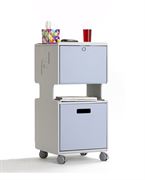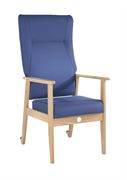A resident with Alzheimer's may suffer frequently from anxiety. This means they become restless, causing a need to move around, or become upset in certain places or when focused on specific details.
Potential triggers for agitation
Numerous physical disorders, drug interactions, and situations that impair one's capacity to think can all contribute to anxiety and agitation. In the end, a person with dementia is biologically losing their capacity to deal with new knowledge and stimuli. It is a direct consequence of the illness.
Agitation may result from the following circumstances:
- Changing residences or nursing homes
- Environmental changes, such as travel, hospitalisation, or house guests;
- Changes in carer arrangements;
- False alarms;
- Fear and exhaustion brought on by attempting to make sense of a perplexing reality.
Advice for reducing agitation
To stop or lessen agitation, make the setting quiet. Take tensions away. This may entail transferring the person to a more secure or peaceful location, or providing a security object, a place to rest, or some seclusion. Try relaxing practises and cutting back on coffee.
• Avoid triggers in the environment. Triggers include glare, noise, and background distractions like watching television.
• Keep an eye on your comfort. Examine yourself for discomfort, aches, thirst, constipation, a full bladder, exhaustion, infections, and skin rashes. Make sure the temperature is appropriate for the space. Be understanding of people's worries, imagined dangers, and frustrations in expressing their wants.
• Make routines and tasks simpler.
• Give people a chance to exercise. Take a walk. Together, you garden. Play music, and start moving.
How to respond
Do: Back off and ask permission; use calm, positive statements; reassure; slow down; add light; offer guided choices between two options; focus on pleasant events; offer simple exercise options, try to limit stimulation.
Say: May I help you? Do you have time to help me? You're safe here. Everything is under control. I apologise. I'm sorry that you are upset. I know it's hard. I will stay with you until you feel better.
- Listen to the frustration. Find out what may be causing the agitation, and try to understand.
- Provide reassurance. Use calming phrases such as: "You're safe here;" "I'm sorry that you are upset;" and "I will stay until you feel better." Let the person know you are there.
- Involve the person in activities. Try using art, music or other activities to help engage the person and divert attention away from the anxiety.
- Modify the environment. Decrease noise and distractions, or relocate.
- Find outlets for the person's energy. The person may be looking for something to do. Take a walk or go for a car ride.
- Check yourself. Do not raise your voice, show alarm or offense, or corner, crowd, restrain, criticize, ignore or argue with the person. Take care not to make sudden movements out of the person's view.
- See the doctor. See the person with dementia's primary care physician to rule out any physical causes or medication-related side effects.

















